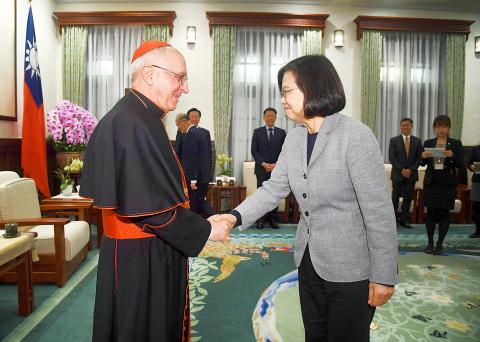Pope Francis’ special envoy arrived in Taiwan yesterday to attend the National Eucharistic Congress, a decision which shows that the Vatican deeply cherishes Catholics in Taiwan, the Ministry of Foreign Affairs said in a statement.
Cardinal Fernando Filoni, prefect of the Congregation for the Evangelization of Peoples, is to attend the concluding celebration of the Fourth National Eucharistic Congress in Yunlin County today, the statement said.
At a meeting with Filoni at the Presidential Office Building yesterday, President Tsai Ing-wen (蔡英文) said that Catholics have been a major force for good in Taiwan, where different religions have coexisted and interacted peacefully.

Photo: CNA
“The Vatican and Taiwan have held several religious meetings. We hope that Filoni’s visit will help further promote mutual understanding and exchanges between the two sides,” Tsai said.
Filoni’s visit is to last until Sunday. He also met with Vice President Chen Chien-jen (陳建仁) yesterday and is due to attend a series of Catholic events, the ministry said.
The congress is a gathering of clergy and lay people to bear witness to the real presence of Jesus in the Eucharist, an important Roman Catholic doctrine, it said.
Since 2011, Taiwan’s seven Catholic dioceses have taken turns hosting the event every two to three years. This year’s congress is being hosted by the Diocese of Chiayi, but is to be staged at Yunlin County Stadium.
The pope in 2016 sent Cardinal Giuseppe Versaldi, prefect of the Congregation for Catholic Education, to attend the Third National Eucharistic Congress, the ministry said.
The visit comes after a group of Taiwanese bishops in May last year held their first ad limina meeting with the pope in 10 years to report on the state of their dioceses.
The bishops invited the pope to visit Taiwan, but he decided to send Filoni instead.

CHAOS: Iranians took to the streets playing celebratory music after reports of Khamenei’s death on Saturday, while mourners also gathered in Tehran yesterday Iranian Supreme Leader Ayatollah Ali Khamenei was killed in a major attack on Iran launched by Israel and the US, throwing the future of the Islamic republic into doubt and raising the risk of regional instability. Iranian state television and the state-run IRNA news agency announced the 86-year-old’s death early yesterday. US President Donald Trump said it gave Iranians their “greatest chance” to “take back” their country. The announcements came after a joint US and Israeli aerial bombardment that targeted Iranian military and governmental sites. Trump said the “heavy and pinpoint bombing” would continue through the week or as long

TRUST: The KMT said it respected the US’ timing and considerations, and hoped it would continue to honor its commitments to helping Taiwan bolster its defenses and deterrence US President Donald Trump is delaying a multibillion-dollar arms sale to Taiwan to ensure his visit to Beijing is successful, a New York Times report said. The weapons sales package has stalled in the US Department of State, the report said, citing US officials it did not identify. The White House has told agencies not to push forward ahead of Trump’s meeting with Chinese President Xi Jinping (習近平), it said. The two last month held a phone call to discuss trade and geopolitical flashpoints ahead of the summit. Xi raised the Taiwan issue and urged the US to handle arms sales to

State-run CPC Corp, Taiwan (CPC, 台灣中油) yesterday said that it had confirmed on Saturday night with its liquefied natural gas (LNG) and crude oil suppliers that shipments are proceeding as scheduled and that domestic supplies remain unaffected. The CPC yesterday announced the gasoline and diesel prices will rise by NT$0.2 and NT$0.4 per liter, respectively, starting Monday, citing Middle East tensions and blizzards in the eastern United States. CPC also iterated it has been reducing the proportion of crude oil imports from the Middle East and diversifying its supply sources in the past few years in response to geopolitical risks, expanding

Pro-democracy media tycoon Jimmy Lai’s (黎智英) fraud conviction and prison sentence were yesterday overturned by a Hong Kong court, in a surprise legal decision that comes soon after Lai was jailed for 20 years on a separate national security charge. Judges Jeremy Poon (潘兆初), Anthea Pang (彭寶琴) and Derek Pang (彭偉昌) said in the judgement that they allowed the appeal from Lai, and another defendant in the case, to proceed, as a lower court judge had “erred.” “The Court of Appeal gave them leave to appeal against their conviction, allowed their appeals, quashed the convictions and set aside the sentences,” the judges